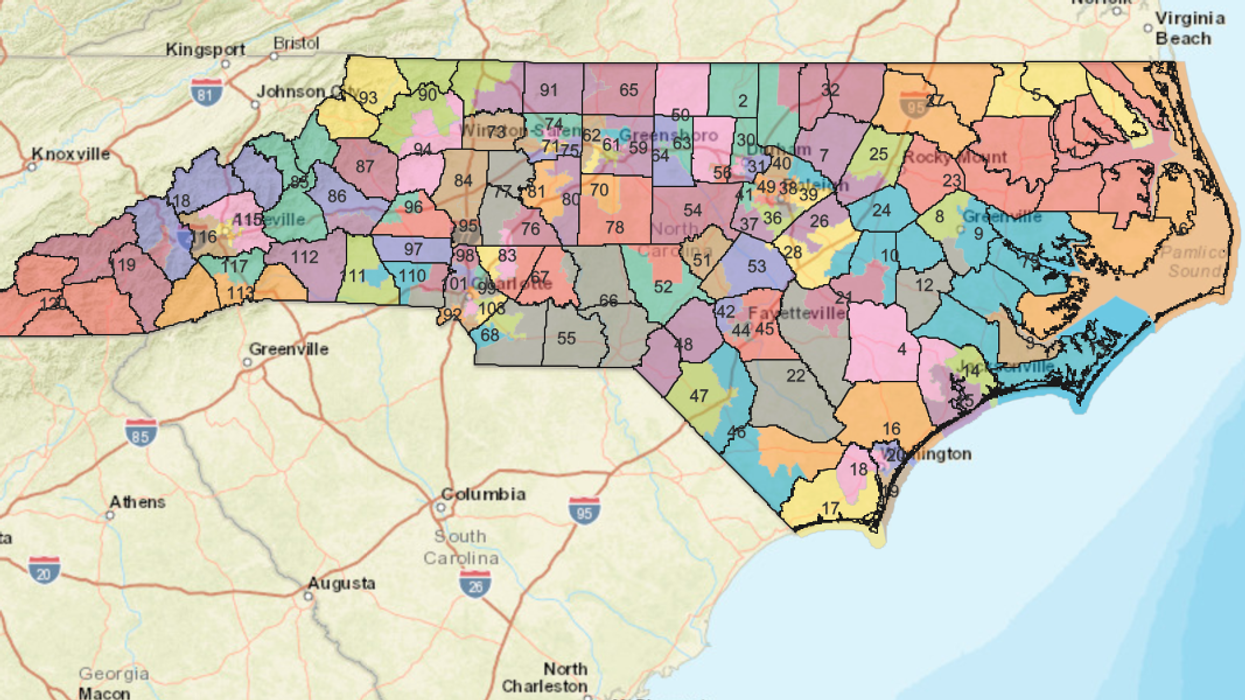North Carolina's state legislative district lines are so contorted to favor Republicans that they violate the state constitution, a panel of three state judges ruled unanimously on Tuesday.
The ruling is a breakthrough victory for crusaders against partisan gerrymandering. They chose North Carolina first this summer when they turned to the state courts for sympathy, after the U.S. Supreme Court declared that federal courts have no authority to referee the limits of partisan power grabs in the drawing of electoral boundaries.
But the Supreme Court decision was clear in saying state courts could consider such gerrymandering claims based on the constitutions of their own states, some of which have provisions that are more expansive than the federal document.
The North Carolina constitution, for example, has a "free elections" clause that the judges cited in their ruling, saying it was breeched (as were the document's protections for the free speech, equal protection and freedom of assembly for the state's Democratic voters) when the GOP-majority legislature drew maps to assure they'd dominate elections for the state House and state Senate at least through the end of the decade.
"Extreme partisan gerrymandering does not fairly and truthfully ascertain the will of the people," the judges wrote. "Voters are not freely choosing their representatives. Rather, representatives are choosing their voters. It is not the will of the people that is fairly ascertained through extreme partisan gerrymandering. Rather, it is the will of the map drawers that prevails."
The decision may well bring to an end one of the longest-running battles in the country over partisans excesses in electoral mapmaking. The majority leader of the state Senate, Republican Phil Berger, said he had no plans to lead an appeal. "We intend to respect the court's decision and finally put this divisive battle behind us," he said in a statement. "Nearly a decade of relentless litigation has strained the legitimacy of this state's institutions, and the relationship between its leaders, to the breaking point. It's time to move on."
The judges (two Democrats and one Republican) gave the legislators two weeks to come up with new maps to be used in the 2020 elections and said they could not take into account any data about election results. They also ordered that the maps be drawn entirely in public, with the computer displays visible to all.
The tight deadline is because candidates have already declared and the first round of primaries is supposed to be in February.
The ruling did not cover the congressional boundaries, which are also drawn to favor the GOP, and so next week's special election to fill one of the House seats will not be disrupted.
In a decision running 357 pages, after a two-week trial in July, the judges said Republican state legislators had employed "surgical precision" to dilute Democratic voters' strength.
All decade, Republicans were consistently able to win more than 60 percent of seats in both of the state's legislative chambers despite only winning about half of the total statewide vote. The GOP majorities were veto-proof until after last year's election.




















Trump & Hegseth gave Mark Kelly a huge 2028 gift